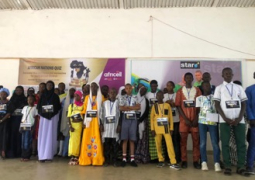The Gambia Organisation for the Visually Impaired (GOVI) has a special school for the blind which was established in 1991 through an amalgamation of The Gambia Society for the Blind and The Gambia Association of the Blind.
Lamin Colley, Executive Director at GOVI said the school is a Non-Governmental Organization with 50 students. He added that the school provides students with school uniforms, transportation and a school feeding programs.
"The Government pays our teachers salary and 50% of the transport fare," he said.
Mr. Colley said despite the efforts, students still struggle with their learning activities.
Colley said papers used by the students to write and other learning materials are not available in the country.
He added that they do not also have access to authors to seek permission from them to photocopy their novels for children to be able to read extensively.
He added that they have only 30 Braille machines compared to the number of students in the school.
"Students from Grade two to six use the Braille machines while the rest do not due to their limited number,” he explained.
Mr. Colley said the school is 90% dependant on donors, noting that since the outbreak of Covid-19 most donors diverted their assistance to Covid-19 related programs.
According to him, at the moment they are struggling with only one major donor who is supporting their rehabilitation project and not education project.
“Visually impaired persons can make lots of difference in society when given access to quality education,” he stated.
Research has revealed that the major challenge facing visually impaired students in science education is the overwhelming mass of visual materials which are continually exposed, such as textbooks, class outlines, class schedules, writing, models, images and other graphic materials.





